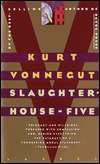Introduction
This is a study guide to Slaughterhouse-Five by Kurt Vonnegut. The work fails as a traditional anti-war book because even the main character does not condemn the destruction and death he experiences in Dresden. Instead, Billy Pilgrim comes to view the event as something that happened and could not have been changed. He is so far convinced of this fact that he readily agrees when Rumfoord, the military historian, arrogantly insists that the destruction of Dresden, though unfortunate, was necessary. Furthermore, Billy agrees that he should pity the men who dropped the bombs and insists that things were not so bad on the ground. "Everything is all right," insists Billy, "everybody has to do exactly what he does." This sentiment, paradoxically, serves as a subtle critique of war in that it undermines the high-minded ideals and intentions of those who wage war in the name of ideology and culture. The view espoused in the novel is anti-war in the sense that it denies war importance and suggests that the less attention society gives to its bloody past the less likely the past is to assert itself in the future. By admonishing people to focus on the good times the novel rhetorically rejects war as worthy of consideration by those concerned with the act of living. Please click on the literary analysis category you wish to be displayed. Back and Next buttons can guide you through all the sections or you can choose to jump from section to section using the links below or the links at the left.

Author: Kurt Vonnegut
Published: November 1991
Pages: 224 pages
ISBN#: 0440180295

Our Networks